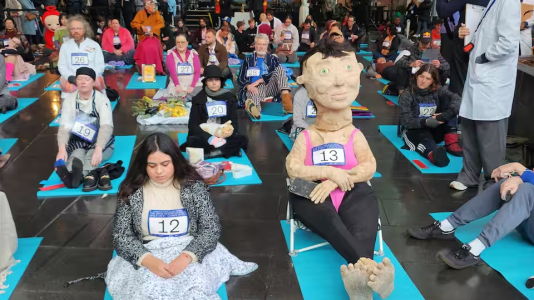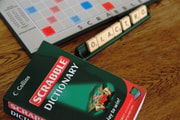The competition that rewards you for doing absolutely nothing—and why seniors might just win it!
By
Maan
- Replies 3
Burnout isn’t just a workplace buzzword—it’s a daily reality for many Australians, even in places known for their laid-back charm.
But what happens when doing nothing becomes a competitive sport aimed at tackling this exact issue?
A curious event in Melbourne has taken an unusual yet powerful approach to challenging hustle culture—one still and silent moment at a time.
Burnout had become such a universal experience that it even inspired an international competition celebrating the art of switching off.
And when the Space Out contest made its Australian debut in Melbourne as part of the Rising Festival, locals didn’t disappoint—with costumes, calmness and creativity that transformed doing nothing into a spectacle.
The rules were simple on the surface: sit still for 90 minutes and try to keep your heart rate as low as possible.
But behind the stillness, each competitor brought their own statement—about hustle culture, modern life, and the value of slowing down.
The concept was first imagined by South Korean artist Woopsyang in 2014, as a direct response to the grind mentality she saw in daily life. ‘Ten years ago when I was working as an artist, I felt so burnt out, and so overwhelmed,’ she said. ‘I was interrogating myself: “Why do I feel so much anxiety? Why can't I stop, why can't I pause?”’
Woopsyang later found that burnout wasn’t unique to South Korea. Even in cities like Melbourne—often viewed as relaxed and easy-going—she noticed people rushing about. ‘Normally Asians think that Western people are very chilled and relaxed, have their nice lifestyle, but then when I came to Melbourne a few days ago and saw people coming and going and rushing, I figured out even in Melbourne, life is so busy and everyone is very overwhelmed,’ she said through an interpreter.
The contest was judged in two parts: a technical score based on participants' heart rate readings taken every 15 minutes, and an artistic score which included costume design and overall ‘vibe’.
Spectators were invited to cast votes using red stickers, responding to handwritten statements explaining why each person had entered.
Some answers were cheeky—‘Full time sofa coder. I do this shit for a living’—while others were heartfelt, like the popular sticker-covered message that read: ‘I want to learn to space out to teach my children that it's already wonderful and valuable to just BE!’
On the day, the lineup of competitors was anything but ordinary. Among them were a retired seeing-eye dog named Tiggolo, two people dressed as rival Teletubbies, a Japanese elder in traditional attire, a supposed engineer (who later admitted he was unemployed), and a woman who became a human fountain.
It was the fountain that ultimately stole the show. Local puppeteer Amelia sat motionless in a pool of water for the full 90 minutes, dressed in a fully functioning costume that included running water flowing from a spout above her head. She had help from two assistants who used kettles to keep the water warm in the face of Melbourne’s biting polar air.
‘I chose to do a puppet that uses water as I think it is the laziest of all elements, it always finds the path of least resistance,’ Amelia said before the contest began. ‘My strategy is to imagine that I am a sea sponge.’
She later dedicated her win to a personal muse: ‘It’s where she likes to sit and experience serenity. [I dedicate this] to everyone here as well, we are all fountains from when we wake up and take a shower until, well, when we next take a shower.’
There was speculation that Amelia’s win might have been helped along by the cold water, which is known to lower the body’s heart rate and blood pressure. Prolonged exposure, of course, can also lead to hypothermia and even death.
But no one could deny the dedication. Tiggolo the Labrador took third place thanks to his naturally zen temperament—though he nearly broke focus around 5:00 pm, his dinner time. The runner-up, Anthony, who first introduced himself as an engineer, later admitted he wasn’t working. His outfit still impressed, and he earned a respectable score.
Costumes ranged from the elaborate to the absurd. One involved a paper mâché head that took two months to build, earning a ‘special prize’. Another involved traditional Japanese robes. All ages and professions were represented, just as Woopsyang had hoped.
‘I thought what if we all need to stop and then we can all take a break and recover,’ she said.
Before the event began, Woopsyang silently took to the stage wearing a white hanbok-inspired dress, dark sunglasses, and a black hat. She unveiled scrolls with messages to participants—one read: ‘Sometimes doing nothing can be the most powerful and valuable act.’
As the scrolls were rolled open, sequinned performer Gabi Barton led some stretching exercises. Then, with a soft chime of a bell into a microphone, the competition began.
Many who took part said they felt deeply relaxed afterwards. For Woopsyang, the Melbourne edition was especially emotional. Though she admitted she now had less time than ever to space out herself, the crowd’s dedication almost moved her to tears.
The Space Out competition may have started as an artistic protest—but in Melbourne, it became something more: a still, strange, and surprisingly moving shared pause from the chaos.
Curious how this quirky contest plays out overseas? A recent event in South Korea showed just how universal the need to switch off has become.
Take a moment for yourself, press play, and see how doing nothing turned into something extraordinary.
Source: Youtube/Arirang News

In a world that rarely stops moving, could you see yourself sitting still for 90 minutes just to unwind? Let us know your thoughts in the comments.
In a previous story, we shared some quick and easy ways to feel calm when life gets a bit overwhelming—because sometimes, all it takes is a few minutes to reset.
For older Aussies juggling family, health and daily responsibilities, finding small moments to relax can be just as powerful as a 90-minute time-out.
If the Space Out competition sparked your interest, you might find those relaxation tips just as helpful.
Read more: Stressed? These quick tricks will have you feeling relaxed in just minutes
But what happens when doing nothing becomes a competitive sport aimed at tackling this exact issue?
A curious event in Melbourne has taken an unusual yet powerful approach to challenging hustle culture—one still and silent moment at a time.
Burnout had become such a universal experience that it even inspired an international competition celebrating the art of switching off.
And when the Space Out contest made its Australian debut in Melbourne as part of the Rising Festival, locals didn’t disappoint—with costumes, calmness and creativity that transformed doing nothing into a spectacle.
The rules were simple on the surface: sit still for 90 minutes and try to keep your heart rate as low as possible.
But behind the stillness, each competitor brought their own statement—about hustle culture, modern life, and the value of slowing down.
The concept was first imagined by South Korean artist Woopsyang in 2014, as a direct response to the grind mentality she saw in daily life. ‘Ten years ago when I was working as an artist, I felt so burnt out, and so overwhelmed,’ she said. ‘I was interrogating myself: “Why do I feel so much anxiety? Why can't I stop, why can't I pause?”’
Woopsyang later found that burnout wasn’t unique to South Korea. Even in cities like Melbourne—often viewed as relaxed and easy-going—she noticed people rushing about. ‘Normally Asians think that Western people are very chilled and relaxed, have their nice lifestyle, but then when I came to Melbourne a few days ago and saw people coming and going and rushing, I figured out even in Melbourne, life is so busy and everyone is very overwhelmed,’ she said through an interpreter.
The contest was judged in two parts: a technical score based on participants' heart rate readings taken every 15 minutes, and an artistic score which included costume design and overall ‘vibe’.
Spectators were invited to cast votes using red stickers, responding to handwritten statements explaining why each person had entered.
Some answers were cheeky—‘Full time sofa coder. I do this shit for a living’—while others were heartfelt, like the popular sticker-covered message that read: ‘I want to learn to space out to teach my children that it's already wonderful and valuable to just BE!’
On the day, the lineup of competitors was anything but ordinary. Among them were a retired seeing-eye dog named Tiggolo, two people dressed as rival Teletubbies, a Japanese elder in traditional attire, a supposed engineer (who later admitted he was unemployed), and a woman who became a human fountain.
It was the fountain that ultimately stole the show. Local puppeteer Amelia sat motionless in a pool of water for the full 90 minutes, dressed in a fully functioning costume that included running water flowing from a spout above her head. She had help from two assistants who used kettles to keep the water warm in the face of Melbourne’s biting polar air.
‘I chose to do a puppet that uses water as I think it is the laziest of all elements, it always finds the path of least resistance,’ Amelia said before the contest began. ‘My strategy is to imagine that I am a sea sponge.’
She later dedicated her win to a personal muse: ‘It’s where she likes to sit and experience serenity. [I dedicate this] to everyone here as well, we are all fountains from when we wake up and take a shower until, well, when we next take a shower.’
There was speculation that Amelia’s win might have been helped along by the cold water, which is known to lower the body’s heart rate and blood pressure. Prolonged exposure, of course, can also lead to hypothermia and even death.
But no one could deny the dedication. Tiggolo the Labrador took third place thanks to his naturally zen temperament—though he nearly broke focus around 5:00 pm, his dinner time. The runner-up, Anthony, who first introduced himself as an engineer, later admitted he wasn’t working. His outfit still impressed, and he earned a respectable score.
Costumes ranged from the elaborate to the absurd. One involved a paper mâché head that took two months to build, earning a ‘special prize’. Another involved traditional Japanese robes. All ages and professions were represented, just as Woopsyang had hoped.
‘I thought what if we all need to stop and then we can all take a break and recover,’ she said.
Before the event began, Woopsyang silently took to the stage wearing a white hanbok-inspired dress, dark sunglasses, and a black hat. She unveiled scrolls with messages to participants—one read: ‘Sometimes doing nothing can be the most powerful and valuable act.’
As the scrolls were rolled open, sequinned performer Gabi Barton led some stretching exercises. Then, with a soft chime of a bell into a microphone, the competition began.
Many who took part said they felt deeply relaxed afterwards. For Woopsyang, the Melbourne edition was especially emotional. Though she admitted she now had less time than ever to space out herself, the crowd’s dedication almost moved her to tears.
The Space Out competition may have started as an artistic protest—but in Melbourne, it became something more: a still, strange, and surprisingly moving shared pause from the chaos.
Curious how this quirky contest plays out overseas? A recent event in South Korea showed just how universal the need to switch off has become.
Take a moment for yourself, press play, and see how doing nothing turned into something extraordinary.
Source: Youtube/Arirang News
Key Takeaways
- Melbourne hosted the Space Out contest, where participants competed by sitting still for 90 minutes with the lowest heart rate.
- The event blended performance and protest, with costumes and personal messages reflecting burnout and modern life's fast pace.
- Local puppeteer Amelia won while dressed as a human fountain, with cold water possibly aiding her calmness.
- South Korean artist Woopsyang created the competition to challenge hustle culture and was moved by the heartfelt participation.
In a world that rarely stops moving, could you see yourself sitting still for 90 minutes just to unwind? Let us know your thoughts in the comments.
In a previous story, we shared some quick and easy ways to feel calm when life gets a bit overwhelming—because sometimes, all it takes is a few minutes to reset.
For older Aussies juggling family, health and daily responsibilities, finding small moments to relax can be just as powerful as a 90-minute time-out.
If the Space Out competition sparked your interest, you might find those relaxation tips just as helpful.
Read more: Stressed? These quick tricks will have you feeling relaxed in just minutes








